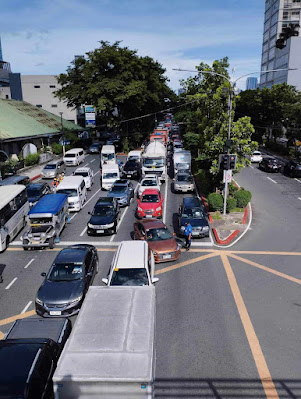Last August 2022, the Supreme Court issued a temporary restraining order (TRO) against the implementation of the no-contact apprehension policy (NCAP) for traffic violators in Metro Manila.
The TRO stops the implementation of NCAP-related programs and ordinances and any apprehensions through the said policy and ordinances "shall be prohibited until further orders from the Court."The order also halted the Land Transportation Office (LTO) and all parties acting on its behalf from giving out motorist information to all government units, cities, and municipalities enforcing NCAP programs and ordinances.
But last June 14, 2023, renewed calls to bring back NCAP were revitalized after a fatal accident happened at the EDSA Shaw Boulevard tunnel where a motorcycle driver was hit by an SUV drive. Both motorists happened to be in the EDSA Carousel Bus Lane resulting in the former getting run over by a tanker driver in the adjacent lane.
Because of this, the Metropolitan Manila Development Authority (MMDA) wasted no time in coordinating with the Office of the Solicitor General in the filing of a motion before the Supreme Court to consider lifting the temporary restraining order on the implementation of the NCAP.
It’s sad to know that a gruesome incident had to happen but aside from this, MMDA acting chairman Romando Artes said they will use the data they obtained in the past months showing an increase in the number of road accidents and traffic violations after the NCAP was suspended in August last year.
“We find it difficult to enforce the exclusivity of the said lane without the certainty of a CCTV-assisted apprehension, thereby exposing our motorcycle riders to a greater risk,” said Artes. “We keep on reminding motorists not to use the innermost lane of EDSA as it may result in an accident, but despite our repeated calls and pleas, many drivers of privately-owned vehicles and motorcycle riders disregard the policy,” Artes added.
Aside from MMDA, Metro Manila Council President and San Juan Mayor Francis Zamora is also leading the discussion to raise the TRO on NCAP.
According to Zamora, MMDA data shows from August 2022 to May of the present year has already resulted in an average of 25,926 per month as compared to a monthly average of 9,500 before NCAP was suspended.
“This data shows that we have more than a double increase in the number of violations. Having been Mayor of San Juan for the last four years, it is close to impossible to have traffic enforcers all over the city of San Juan, more so all over the entire Metro Manila. Having NCAP deters motorists from committing traffic violations” shared Zamora.
For those with an interest in road safety, NCAP represents a step forward, in terms of our enforcement of traffic laws.
In the few months it was implemented in San Juan, Quezon City, Manila, Valenzuela City, Muntinlupa City and Paranaque City, NCAP did bring benefits that some would say were unfairly ignored in the debate.
These cities that have fully implemented NCAP cited decrease in obstructions, choking of traffic from apprehended vehicles, reckless driving, and hazardous motorists’ habits.
It is unfortunate that we needed to wait for a fatal accident in order for us to see the benefits of NCAP. And aside from this incident, many agree that it is now time for the TRO to be lifted. With NCAP already addressing a lot of the public’s concern, this July the handheld device for the Single Ticketing System (STS) will have a pilot test to be spearheaded by the Metro Manila Development Authority (MMDA).
With the STS in place, it will enable the Metro Manila local government units to strictly enforce traffic laws, at the same time, harmonize the existing national and local laws on traffic enforcement to establish an effective transport and traffic management system.
Aside from MMDA, Metro Manila Council President and San Juan Mayor Francis Zamora is also leading the discussion to raise the TRO on NCAP.
According to Zamora, MMDA data shows from August 2022 to May of the present year has already resulted in an average of 25,926 per month as compared to a monthly average of 9,500 before NCAP was suspended.
“This data shows that we have more than a double increase in the number of violations. Having been Mayor of San Juan for the last four years, it is close to impossible to have traffic enforcers all over the city of San Juan, more so all over the entire Metro Manila. Having NCAP deters motorists from committing traffic violations” shared Zamora.
For those with an interest in road safety, NCAP represents a step forward, in terms of our enforcement of traffic laws.
In the few months it was implemented in San Juan, Quezon City, Manila, Valenzuela City, Muntinlupa City and Paranaque City, NCAP did bring benefits that some would say were unfairly ignored in the debate.
These cities that have fully implemented NCAP cited decrease in obstructions, choking of traffic from apprehended vehicles, reckless driving, and hazardous motorists’ habits.
It is unfortunate that we needed to wait for a fatal accident in order for us to see the benefits of NCAP. And aside from this incident, many agree that it is now time for the TRO to be lifted. With NCAP already addressing a lot of the public’s concern, this July the handheld device for the Single Ticketing System (STS) will have a pilot test to be spearheaded by the Metro Manila Development Authority (MMDA).
With the STS in place, it will enable the Metro Manila local government units to strictly enforce traffic laws, at the same time, harmonize the existing national and local laws on traffic enforcement to establish an effective transport and traffic management system.



No comments:
Post a Comment